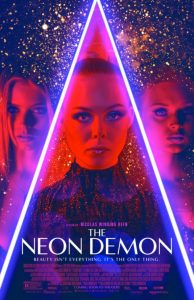
Many will see “The Neon Demon” as the continuing freefall for Nicolas Winding Refn. Just like “Only God Forgives,” it’s a self-indulgent visual feast with an incredibly dense story, even more so. Refn relies on symbolism and esoteric storytelling to carry “The Neon Demon,” which will be a weight many won’t want on their shoulders. As for myself, I love his approach and welcomed his latest film with open arms! Admittedly, it is a lesser Refn joint, but a lesser Refn is still a good film.
What makes “The Neon Demon” lesser is its overall story. The film has a fine premise; it’s just been explored far too often. It revolves around Jesse (Elle Fanning), an aspiring model new to Los Angeles. She’s immediately sucked into the seedy underbelly of the modeling scene with the expected results to follow. The innocent young girl slowly transforms into a narcissist, pushing away those who truly care for her.
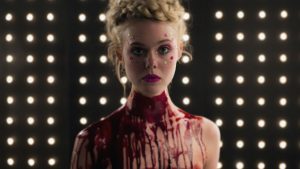
What Refn does different is in applying his symbolism to the proceedings. He portrays the modeling scene as Hell, with the angelic Jesse being sucked down into it. This is why everyone in the industry is immediately drawn to her: she resembles purity, which they so desperately want to corrupt. Her competition are vain, succumbing to plastic surgery to meet the industry’s demands and shoving anyone who gets in their way to the side. They’re not tantalizing to the producers and photographers, as they’re already broken souls. Jesse’s soul is mostly pure, with only her absentee parents tarnishing her.
This isn’t the first film to use the vanity of Los Angeles as a metaphor for Hell. What separates it are Refn’s visuals. He and his cinematographer, Natasha Braier, bask the film in neon and dark blues. The neon represents the hypnotic draw of sin, while the dark blues act as foreboding darkness. There are definitely moments where Refn indulges too much in the visuals, but this is a film about self-indulgence, so it complements the tone perfectly. That and I’ll never tire of Refn’s fetishism for visuals.
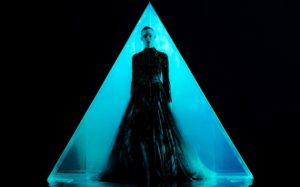
Like his idol, Alejandro Jodorowsky, Refn revels in the bizarre. Characters don’t simply symbolize demons, but act as such. One model sucks the blood from an open wound Jessie suffers as a way to drive home the point of the industry’s bloodthirst. Moments like this are admittedly too on the nose, but bewitching enough for us to accept them. We’re even willing to accept the character of Hank (Keanu Reeves), the sleazy motel owner whose sole purpose is to drive home the point that L.A. is filled with scumbags. Keanu is so charismatically detestable that we accept his role in the film, even if we know he could be ultimately axed and the story wouldn’t suffer one bit.
One character that is necessary for the story to progress is Ruby (Jena Malone). She’s a makeup artist who takes Jesse under her wing, acting like a big sister. This takes a turn for the awkward when her feelings for Jesse become pronounced. While there’s no blood relation between the two, creepy incestuous vibes are abound when Ruby makes her move. Not helping matters is how predatory she is in her approach, which makes more sense as the film progresses.
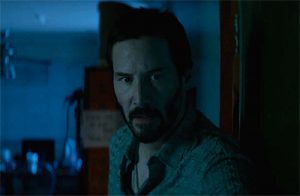
Refn’s handling of the awkward moments is what makes them work. He lingers on them, allowing the scenes to get under your skin. Anytime a scene is to make the audience uncomfortable, he’ll make sure to drag it out as much as he can. He pulls back just in time (for the most part) to avoid a scene from overstaying its welcome. He does fail in preventing the film itself from overstaying its welcome, dragging out the finale long past its expiration date (though it ends with a great shot).
“The Neon Demon” is rough around the edges. The tone switches back and forth from dense dialogue to represent the banality of modeling to fraught abnormalities such as necrophilia to represent the depths of sin. The tonal shift can be jarring at times, sometimes working in the film’s favor, other times just leaving the viewer cold.
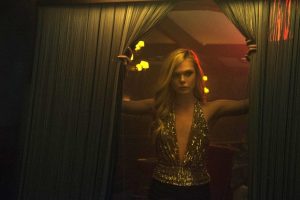
The grotesque happenings are the most beguiling and hold the most power. When Refn focuses on that, on top of his stark symbolism, is when the film shines. It’s when it deviates into the banality that the film suffers. We’re all too familiar with the vapid agent (played by Christina Hendricks this time around), the sleazy photographer, the sweetly innocent boyfriend, and the one-dimensional models. Playing up their vacuous behavior is too threadbare by this point. Even if that is the point, it falls flat when presented with stimulating and wickedly sagacious symbolism.
“The Neon Demon” is too spellbinding overall for its shortcomings to ruin the experience. Hell, I’m at the point where I think Refn’s confidence, mixed with his tremendous eye for visuals and brash symbolism, will prevent any of his films from ever being boring. Even if he were to fail, he’d do so in tremendous fashion. “The Neon Demon” is not a failure, but another mesmerizing experience!
Final Rating: B
